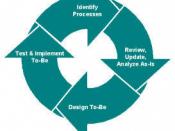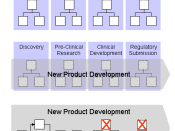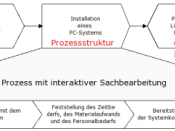TABLE OF CONTENTS
1.Abstract............................................................................2
2.Importance of management......................................................3
3.Introduction to Information Management.................................. ...4
4.Types of Business Process Reengineering.....................................6
5.Applying Business Process Reengineering....................................8
6.Executive Summary...............................................................10
7.Bibliography.......................................................................12
Abstract
Organisations in the public sector are more and more turning to information technology (IT) in order to comply with the central governments that modernise government agenda. However, there is a need in ensuring that the implementation of main IT systems in not regarded as the end but the means to the end of attaining major improvements of performance. This paper suggests that though IT can be an agent for change as it gives opportunities to do things in different way, some business processes redesign should also be undertaken and connected with an IT strategy. The implementation of IT without the processes reengineering might fail in delivering anticipated benefits. The paper stresses the links between process reengineering and benchmarking to allow the design of improved processes and considers approaches to BPR which are best suited to the public sector.
A case study in a local authority is used to illustrate the need to link technology with process to bring about major organisational change.
Importance of management
Any successful business, organisation, or association uses management as its main function. Management includes four distinct categories, which are planning, organising, leading, andcontrolling. These four functions have different characteristics, but conjoined all of them form the qualities of a successful manager.
Planning
This function includes developing a plan that consists of defining the goals and objectives of management, identifying tasks or how the objectives will be achieved, which resources are required, and associating timelines and budgets for the success of task on hand. Planning also includes fulfilling the project's plan, together with careful controls to ensure the plan is being managed...


